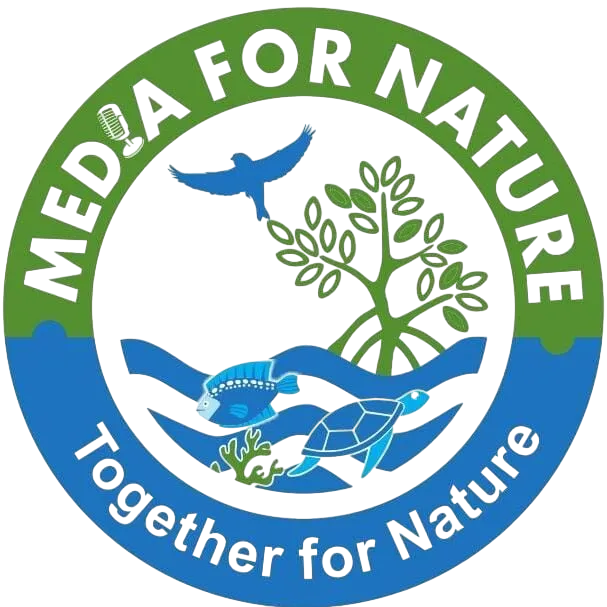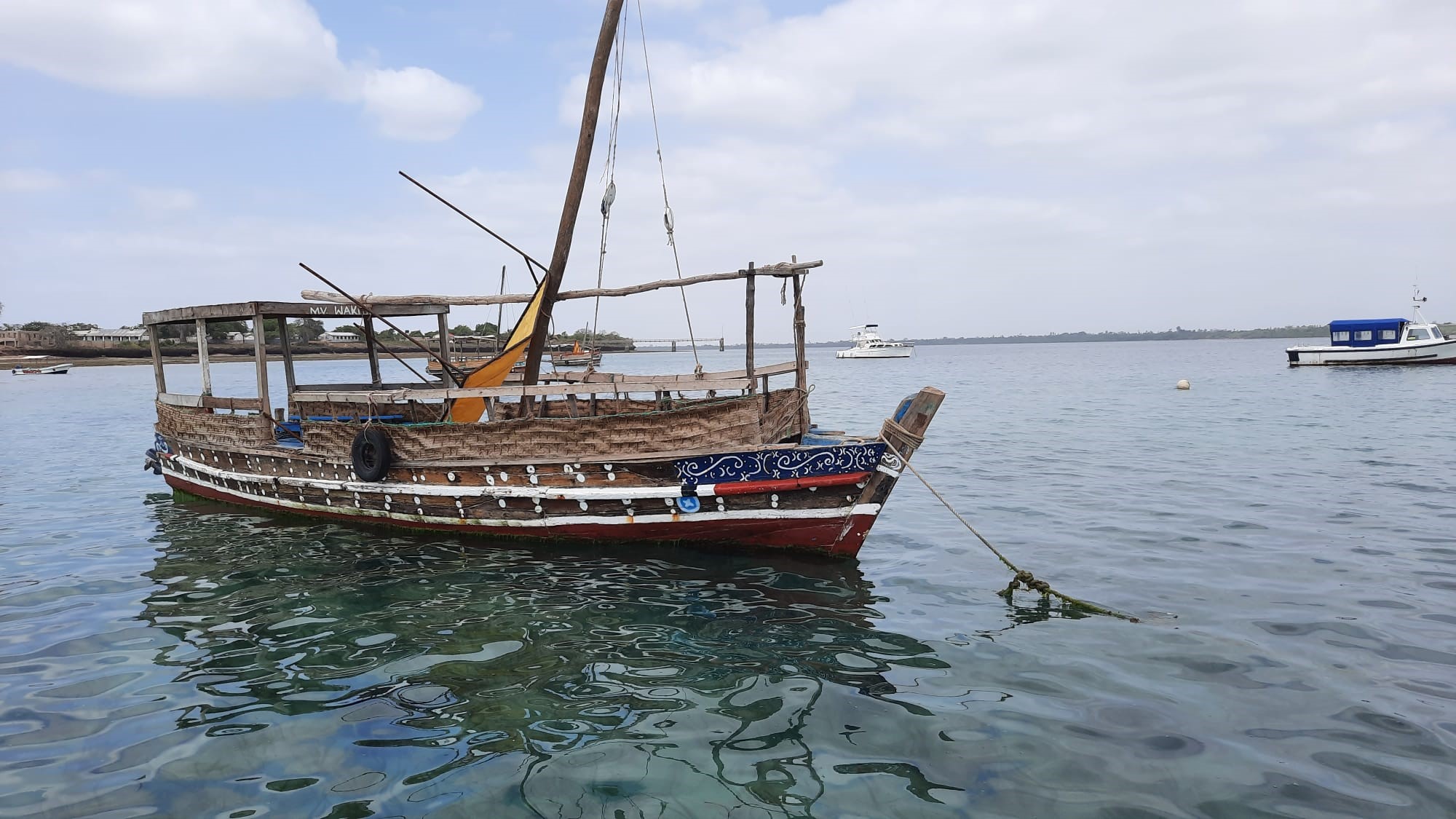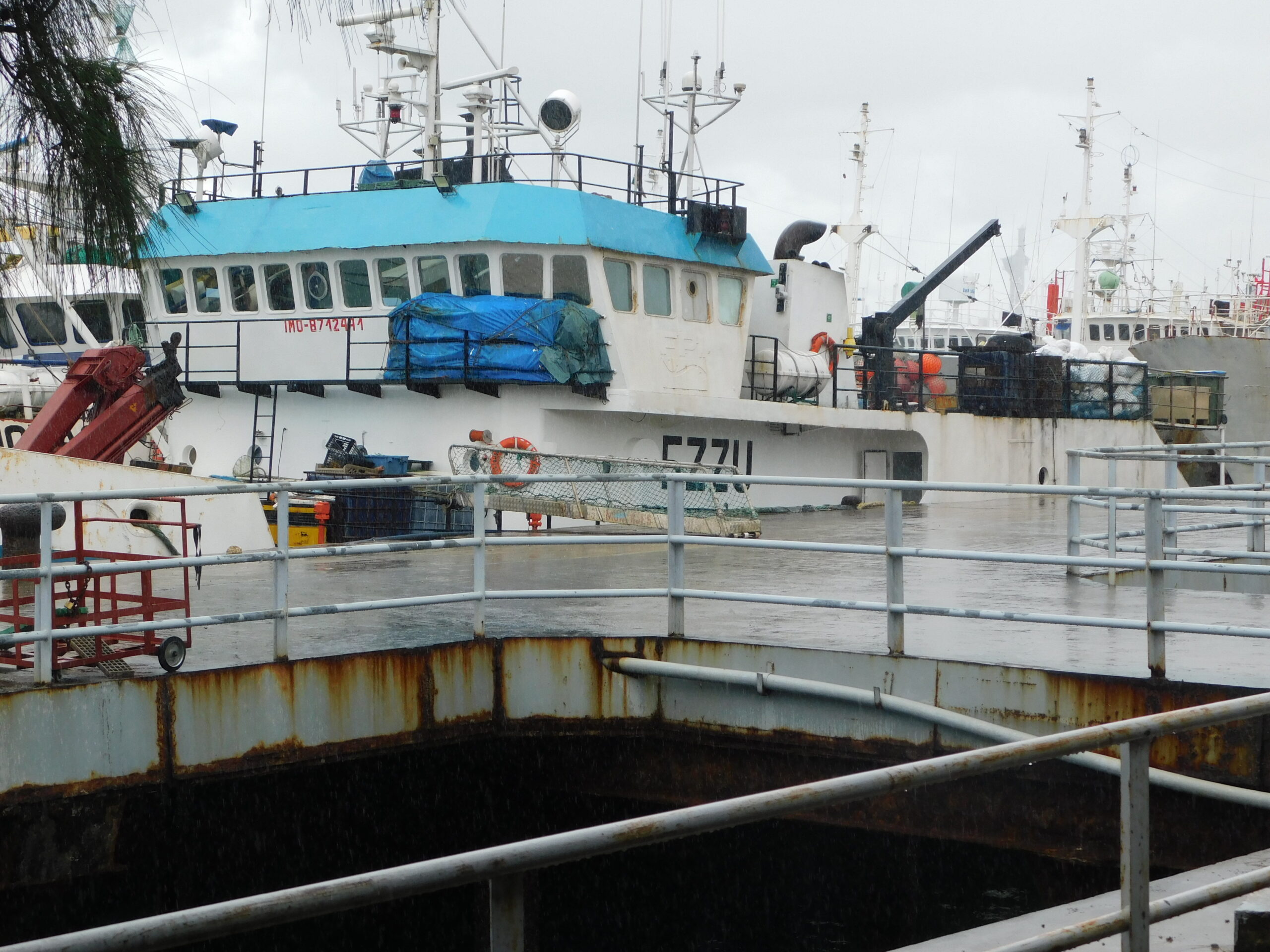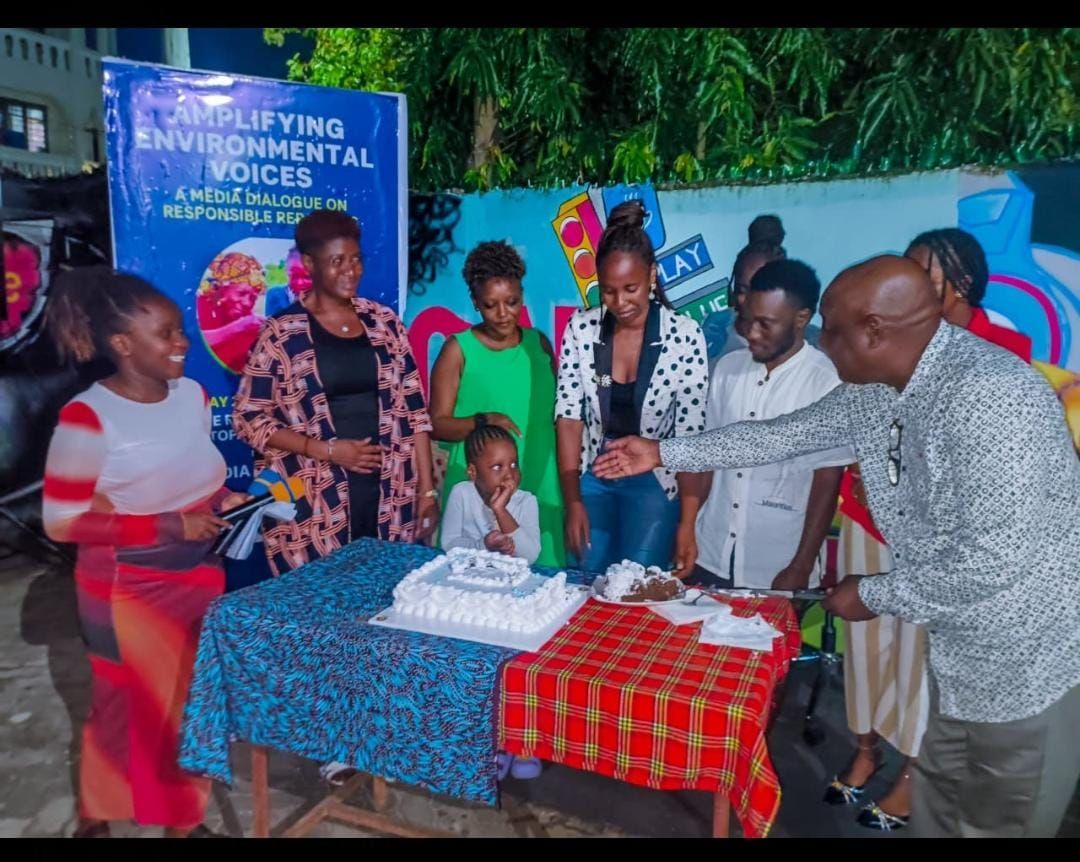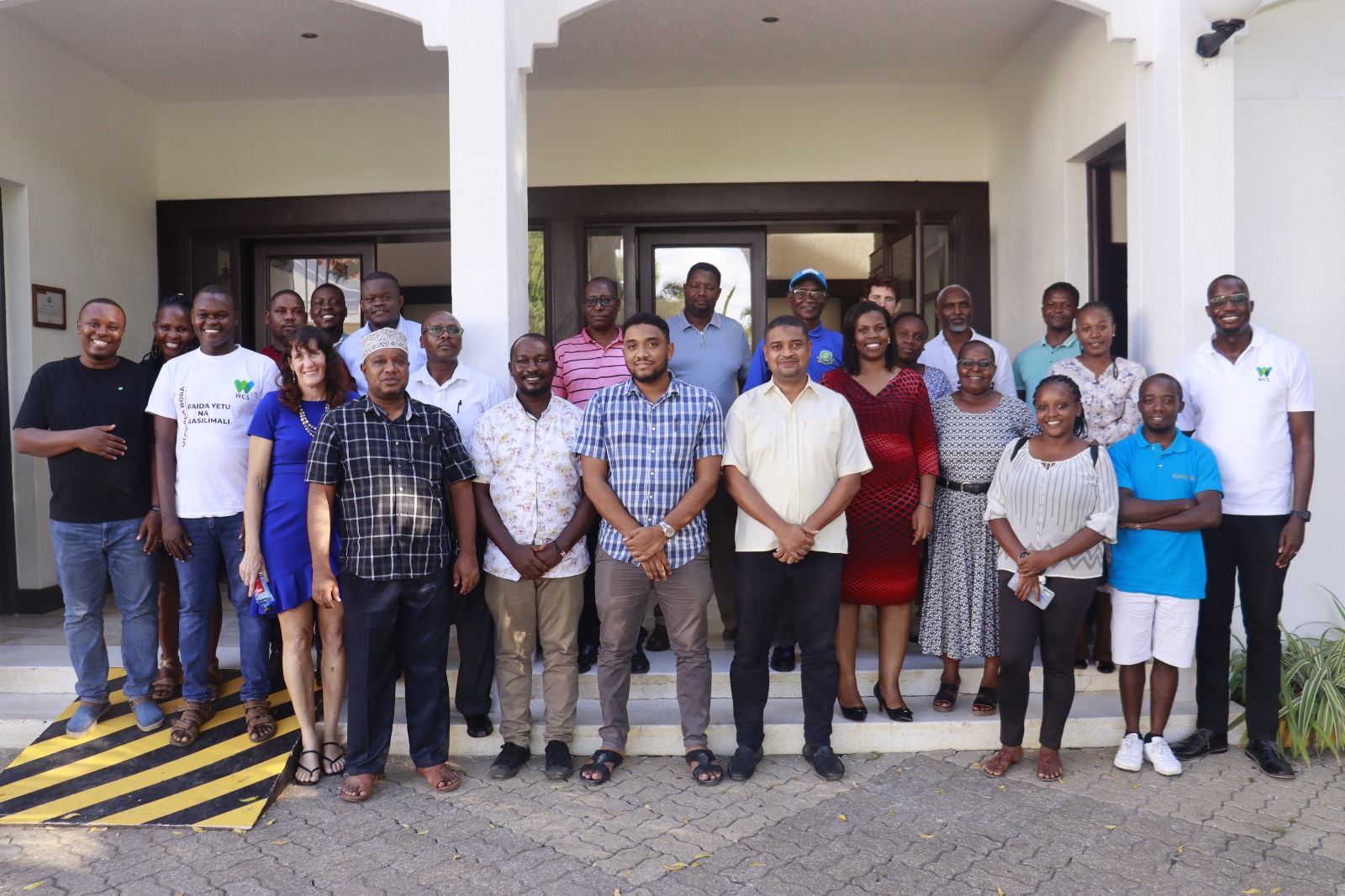Traditional dhow used for marine excursion to Kisite-Mpunguti Marine Protected Area. Photo|Joshua Wambugu
Growing up in Wasini village, Suleiman Kionzo, whose matrimonial home is in Lunga Lunga, an area bordering Kenya and Tanzania, was molded into becoming one of the prominent boat operators in the Shimoni region.
Kionzo, who is a member of the Wasini Boat Youth Operator and a seasoned tour guide, has devoted 15 years to his profession. His primary route involves taking tourists from mainland Shimoni to the breathtaking Kisite Marine National Park.
“I relocated from Lunga Lunga to Wasini at a very young age, and the villagers embraced me, teaching me various ocean-related skills on weekends and holidays when schools were closed. We lived as one family,” he fondly remembers.
The Kisite-Mpunguti Marine Park & Reserve, dubbed as ‘Home of the Dolphin,’ is situated in the Shimoni-Vanga seascape along the southern coast of Kenya. As Kenya’s largest marine protected area, it stands as a beacon of natural wonder, captivating tourists with its unique marine ecosystem, pristine coral reefs, and diverse marine life. Notably, it serves as a crucial migratory route for majestic humpback whales, home to bottle-nosed dolphins and various fish species.
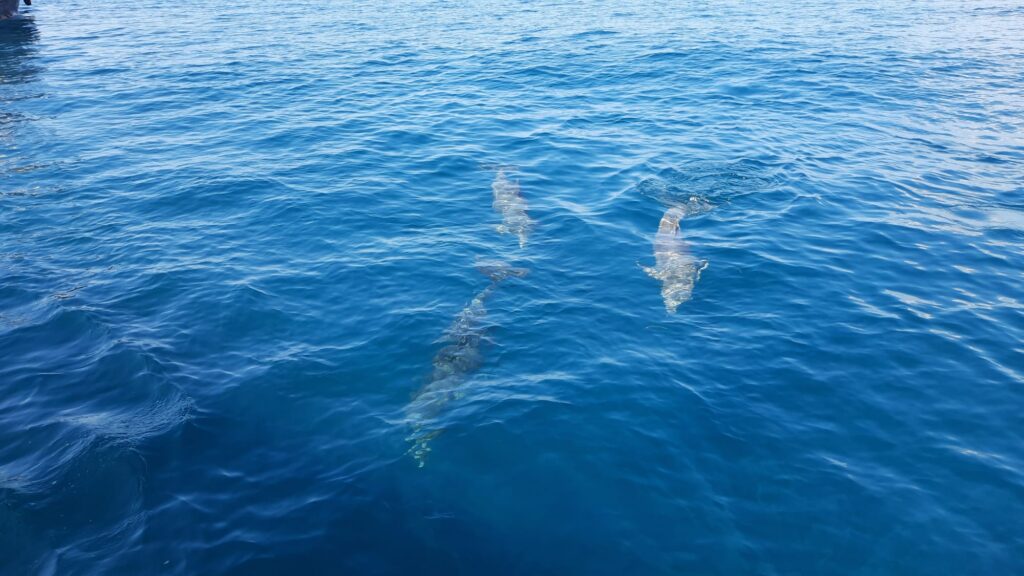
Established as a marine protected area in 1978, the Kisite-Mpunguti Marine Park & Reserve has not only preserved its impressive biodiversity but has also become a symbol of successful conservation management. In recognition of its achievements, the park recently earned the prestigious gold-level Blue Park Award by the Marine Conservation Institute for achieving the highest science-based standards for marine life protection and management.
Beyond its ecological significance, the marine park and adjacent locally marine managed areas (LMMAs) plays a pivotal role in the local economy, sustaining livelihoods through subsistence fishing and thriving marine tourism activities.
According to the Ministry of Tourism, Wildlife & Heritage’s annual tourism sector performance report for 2022, there has been a significant increase in the number of tourists visiting the Kisite Marine National Park in Shimoni from 40,793 in the year 2019 to 73,922 in the year 2022.
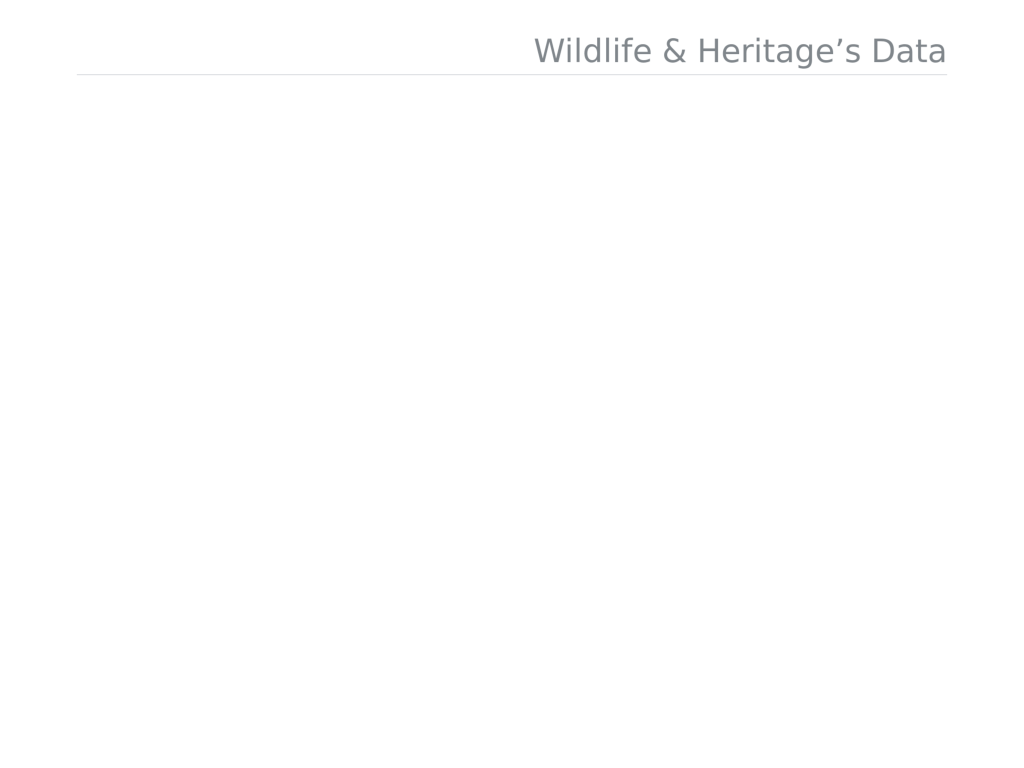
While this shows the area’s attractiveness and growing popularity as a tourist destination, it also raises concerns about the potential environmental impact and the need for responsible tourism practices. With the majority of tourists not being proficient swimmers, there is an elevated risk of damage caused by individuals walking or stepping on the fragile coral reefs.
During low tourist seasons, when the number of visitors dwindles, Kionzo seamlessly transitions into the role of a fisherman. This dual role is common among many boat operators in the area who, like Kionzo, did not pursue formal education in tour guiding.
Kionzo openly acknowledges that some boat operators and tour guides, responsible for hosting and conducting excursions for tourists to the marine park, unintentionally contribute to the degradation of the marine ecosystem. Their activities, such as reckless boat anchoring, unguided snorkeling, and diving, pose significant threats to the fragile marine environment, including corals and other vulnerable species.If left unaddressed, these practices could lead to irreversible damage to delicate marine ecosystems.
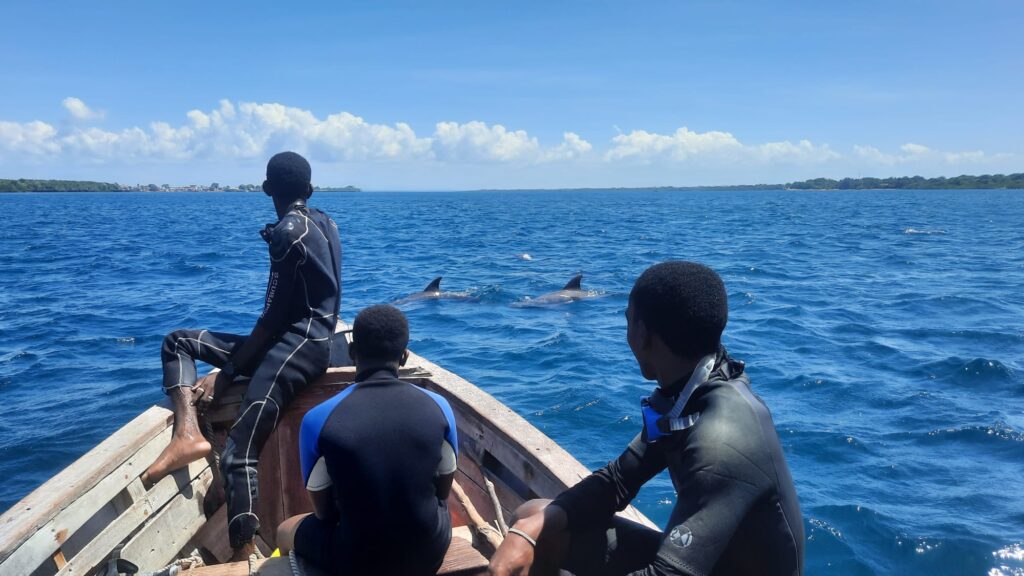
The Threat of Unsustainable Tourism
Tourism can pose a significant threat to marine ecosystems if not managed properly. Some of the negative impacts include:
Coral Bleaching: Unregulated tourism can lead to an increase in water pollution, overfishing, and physical damage to delicate coral reefs, resulting in coral bleaching and eventually death.
Loss of Biodiversity: Irresponsible tourism practices, such as collecting marine organisms as souvenirs, can disrupt the delicate balance of marine ecosystems and lead to a loss of biodiversity.
Damage to Marine Life: Activities like boat anchoring, snorkeling, and diving without proper guidance and respect for marine life can cause physical damage to corals and other vulnerable species.
Empowering Shimoni’s Boat Operators and Tour Guides
To ensure that boat operators and tour guides in the Shimoni area of Kwale County practice responsible tourism, the REEFolution Trust, under the REEF STEWARDSHIP Project supported by the Rufford Foundation, recently organized a two-day workshop aimed at empowering them with responsible tourism practices. The two-day workshop jointly implemented a proposed activity on sensitization of boat operators on pollution, responsible tourism practices, safety SAR (Search and Rescue) under the project ‘Advancing conservation by strengthening the community -MPA interphase in Kisite Mpunguti MPA and its influence zone’ with funding from the Blue Parks Small Grants by the Marine Conservation Institute
Yvonne Muyia, the Programme Coordinator at REEFolution Trust, said the workshop focused on capacity building in responsible tourism practices targeting the boat operators, tour guides and members from the Beach Management Units (BMU). She emphasized that sustainable tourism seeks to minimize negative environmental impact, support local communities, and offer meaningful experiences for travelers.
Muyia pointed out that a significant number of tour guides in the area lack formal training and professionalism.
“Most of the boat operators from this area are not professional tour guides; they simply follow what others have been doing without proper training. Our goal is to standardize tourism practices here and help them understand the benefits of sustainable tourism as a viable source of income,” she stated.
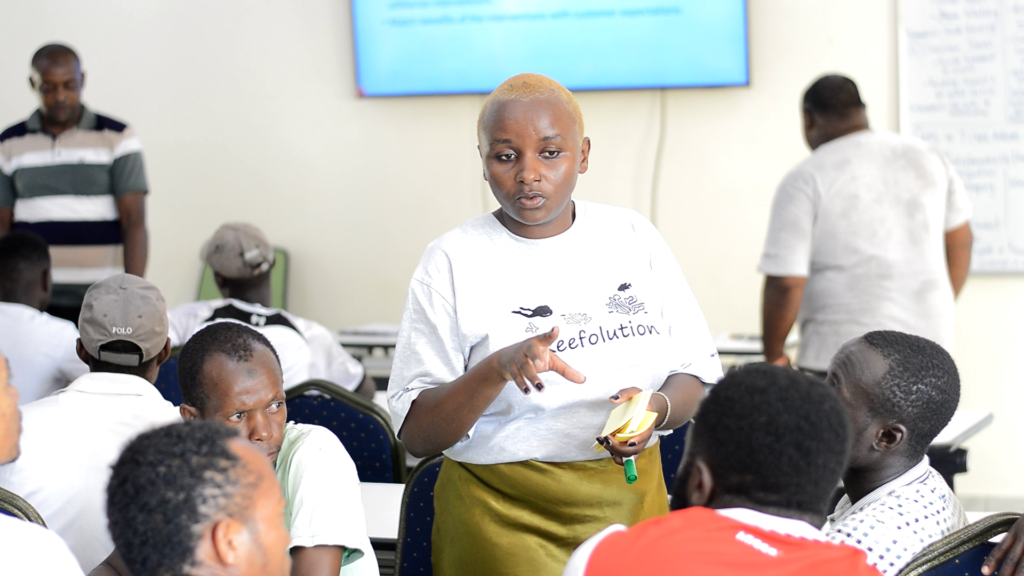
The training involved 38 participants from various groups, including Wasini Youth Boat Operators, Kisite Community Boat Operators, Kibuyuni BMU, Mkwiro BMU, Shimoni BMU, and Wasini BMU.
Muyia emphasized the importance of community involvement in the success of restoration efforts. She pointed out that tourism is a significant economic driver for the people around Shimoni, particularly in the marine areas.
“For conservation to thrive, tourism must also prosper because it serves as an alternative income source for the community. This is why the workshops involved Beach Management Units members (BMUs) and boat operators in the region”, she said.
Among the trainees at the workshop was Mohammed Kassim, a member of the Wasini Beach Management Unit and the group’s secretary. With 15 years of practical experience in tour guiding in Shimoni, where he takes tourists to Wasini Island and Kisite Mpunguti Marine National Park, Kassim expressed how the training has equipped him with new knowledge on handling tourists professionally.
“We will now approach our work as tour guides with a professional mindset, prioritizing the conservation of the marine ecosystem including the corals. I have learned that by actively conserving the environment, we can attract more tourists, as they like visiting well-preserved places,” he shared.
“As a leader, I will actively disseminate this knowledge to my members, focusing on responsible tourism practices. This includes educating them on the proper code of conduct when interacting with tourists and guiding them on the appropriate activities within the park,” he added.
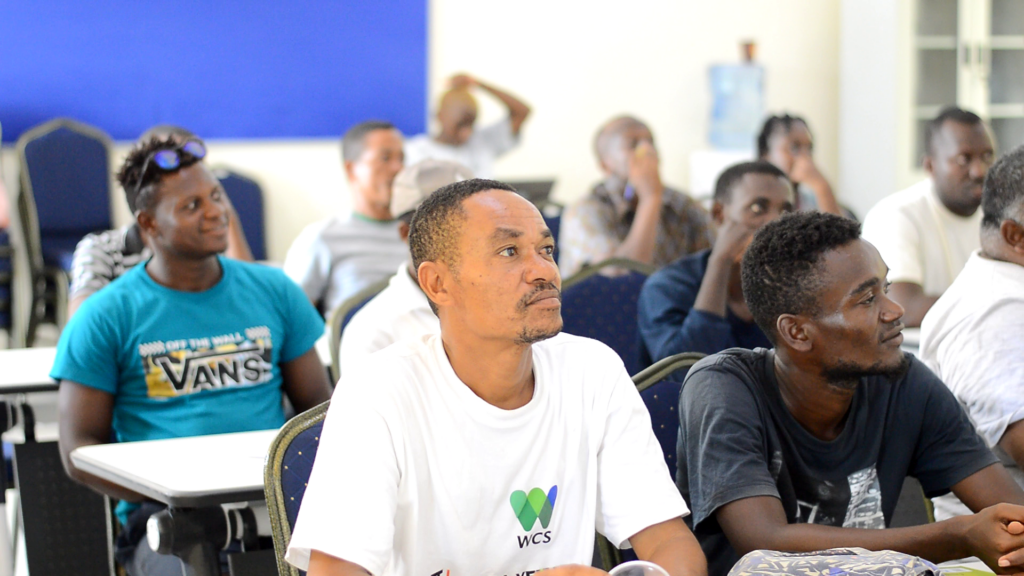
Abdulaziz Hemedi, the secretary of the Wasini Youth Boat Operators, who also serves as a tour guide, has accumulated seven years of experience in the field. Despite his extensive tenure, he openly acknowledges that there were certain aspects he was not aware of and some practices he wasn’t executing correctly.
Hemedi revealed that the training provided him valuable insights into the appropriate approaches to employ when encountering tourists who violate the code of conduct and rules of the marine protected areas and general marine ecosystem. He admitted that he lacked knowledge regarding both the soft and hard approaches to take while on duty.
“I wasn’t aware of these rules, but now I understand that when I observe tourists breaking regulations, such as stepping on coral reefs, which is prohibited, I will first approach them with a soft warning. If they persist, I will escalate to harder approaches, including reporting the incident to authorities like the Kenya Wildlife Services for necessary action,” he explained.
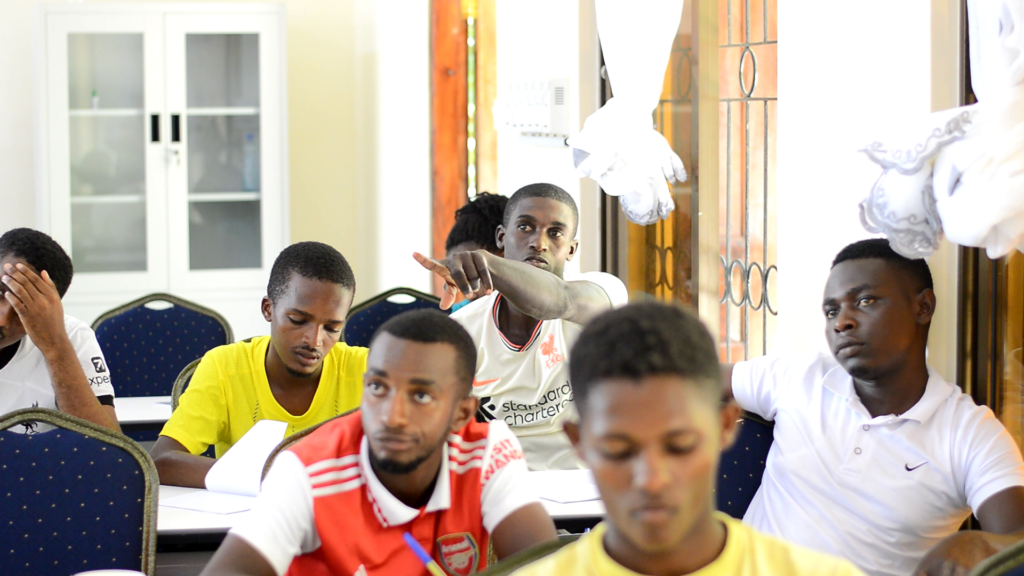
Bridging Knowledge Gaps for Marine Tourism Sustainability
Yatin Patel, a diving instructor from Pilli Pipa Dhow Safaris in Shimoni, emphasized the timeliness of the training provided by REEFolution, stating that tour guides in the region have not received such comprehensive training for over 15 years. He expressed concern that lack of training has left tour guides vulnerable to unintentionally causing harm to the marine ecosystem during the course of their duties. He said many tour guides lack formal training, often entering the profession after observing the practices of others.
“Despite the existence of a code of conduct for guides, some are not adhering to them. For instance, some guides take tourists too close to dolphins in the ocean or allowing them to swim with the dolphins, which is strictly prohibited. Therefore, we have collectively agreed that every boat must have a code of conduct in place at all times, and all rules must be strictly followed,” he explained.
“As guides, it is our responsibility to ensure that tourists follow the rules and refrain from damaging marine ecosystem, our role is to guide tourists, for example advising them not to stand on corals and encouraging them to follow the guidance provided,” he concluded.
On his side Corporal Juma Mando, from Kenya Wildlife Services in Shimoni, said the training has initiated a platform to increase awareness of safe, safety and maritime regulations to the boat operators at the different levels. Expressing optimism that the beneficiaries are now equipped to carry out their duties confidently without fear of unintentionally breaking rules.
Mando, reflecting on his observations in the line of duty, revealed that many boat operators were unaware of their responsibilities as guides to tourists. And emphasized the importance of continuous training of the members to foster responsible tourism practices, thereby contributing to the growth of tourism and the preservation of marine protected areas.
“Through this training, I believe the boat operators and BMU’s have recognized the importance of honesty. This will contribute to the growth of tourism, as guests will receive accurate information and, in turn, share their positive experiences with others, inspiring more visits to the marine protected areas,” he said.
Judy Gona, the Lead Consultant at Sustainable Travel and Tourism Agenda, emphasized the evolving needs of responsible travelers, hence tour guides to align with the global focus on sustainability. As the market for responsible travel grows, she said it is important for tour guides to embrace sustainability principles, as modern travelers seek experiences with guides who are environmentally and culturally responsible.
In the context of coastal and marine tourism, Gona highlighted the challenge of finding responsible guides and sea adventures.
“Travelers today seek guides who understand the stories, values, and cultures of the places they serve, as well as those who demonstrate responsibility to the environment,”she said.
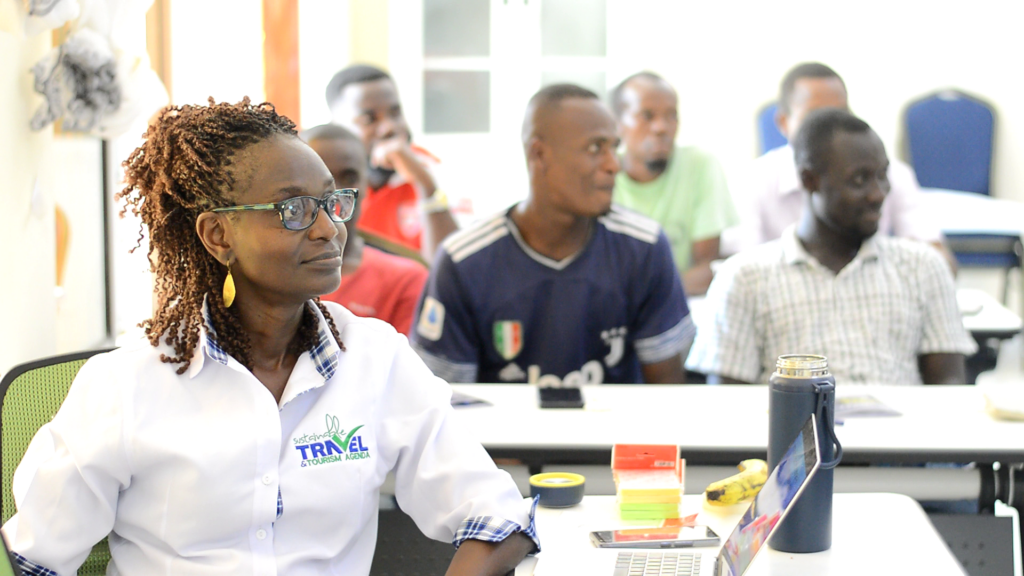
Gona further emphasized that responsible tourism aligns with the 17 Sustainable Development Goals (SDGs), particularly addressing SDG number 13, which focuses on protecting life underwater. She urged guides involved in sea activities such as recreational SCUBA diving, dhow safaris, cruises, ships, and snorkeling to respect and protect marine life. She stressed the significance of preserving the underwater ecosystem, emphasizing that its destruction not only impacts the food chain but jeopardizes the entire biological ecosystem, thereby posing a risk to human lives.
“It is important that we all respect and protect life underwater. This is a critical component of our ecosystem and vital to our existence as human beings,” she concluded.
Joshua Wambugu, the Project Lead for the REEF Stewardship Project and a social science PhD researcher focusing on the societal impact of coral reef restoration said periodical assessment on the knowledge gap and skills among the boat operators and marine tourism guides is critical. He said by understanding their knowledge needs, it becomes easy and convenient to tailor-make experiential learning and knowledge training programmes, particularly on new innovation on marine restoration, responsible tourism, visitor’s experiences and safety.
“Overall, it is great to see positive receptiveness, enthusiasm, and urge by the participants to engage them more, and have periodical interactive training forum, that enriches their capacity with knowledge and awareness,” he concluded.
